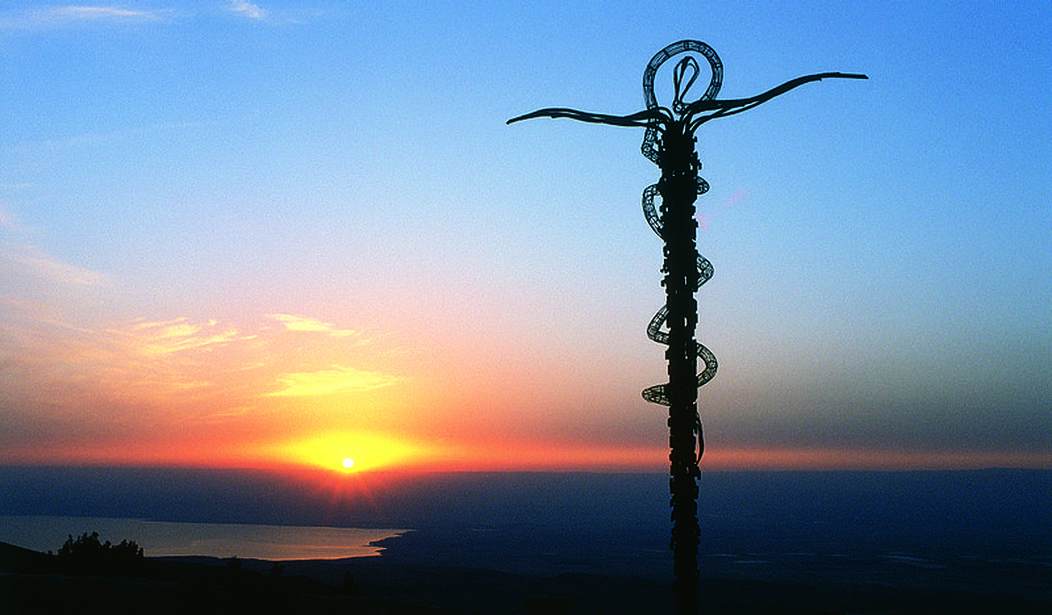Note: I am taking a few days off, so I hope you will enjoy this 2018 reflection on the same readings.
This morning’s Gospel reading is John 3:14–21:
Jesus said to Nicodemus:
“Just as Moses lifted up the serpent in the desert, so must the Son of Man be lifted up, so that everyone who believes in him may have eternal life.”
For God so loved the world that he gave his only Son, so that everyone who believes in him might not perish but might have eternal life. For God did not send his Son into the world to condemn the world, but that the world might be saved through him. Whoever believes in him will not be condemned, but whoever does not believe has already been condemned, because he has not believed in the name of the only Son of God. And this is the verdict, that the light came into the world, but people preferred darkness to light, because their works were evil. For everyone who does wicked things hates the light and does not come toward the light, so that his works might not be exposed. But whoever lives the truth comes to the light, so that his works may be clearly seen as done in God.
Today’s Gospel passage is more ubiquitously known for the second sentence from Jesus, John 3:16, and for good reason: For God so loved the world that he gave his only Son, so that everyone who believes in him might not perish but might have eternal life. That encapsulates the divine nature and worldly mission; it provides the core belief of Christianity. Today, though, we might focus more on Christ’s first words to Nicodemus to give a greater insight into what His mission means, and how the Lord constantly offers us opportunities for redemption.
A few years ago, we had an opportunity to join a pilgrimage to the Holy Land, which took us through both Jordan and Israel. Mount Nebo was one of the first stops we made, the site where Moses was allowed to gaze upon the Promised Land that he was forbidden to enter. The site has a breathtaking view of Israel, although on the day we were there, a haze limited the distance we could see. Our guide told us that on clear days, one could see all the way to Jerusalem.
In the millennia following Moses, Nebo has become a focal point for travelers and pilgrims. The remains of a Byzantine church dating back more than 1500 years was discovered at the summit 85 years ago, for instance, and restoration on mosaic floors continues. That was mostly closed off during our visit, but smaller finds were on display. One piece of particular note was the recreation of Moses’ healing pole described in Numbers 21:5-9. This is an artistic representation, which I have included as the front-page image, not a historical artifact, and it reintroduced to me the story of the serpents during the 40-year wanderings of the Israelites in the desert, which Jesus references in this Gospel reading today.
In short, as happened on other occasions, the Israelites had grown weary and rebellious during their journey. Even though the Lord had “utterly destroyed” their enemies at their call to Him, they quickly began complaining to Moses. “Why have you brought us up out of Egypt to die in the wilderness?” they demanded to know. “For there is no food and no water, and we loathe this worthless food.”
One might imagine that the Lord was not pleased with their ingratitude, and a plague of “fiery serpents” descended on the Israelites. It didn’t take long to get the message, and Moses prayed in repentance for the people. The Lord told Moses to create a replica of the fiery serpent and to set it on a pole so that anyone bitten could be healed just by gazing upon it. The pole negated the venom of the serpent and healed anyone who turned their eyes to the pole.
Clearly, while this is a recounting of the history of the Israelites in a literal sense, this is also an analogy to sin, and at its most basic: rebellion against God. Rebellion is the sin that Adam and Eve committed in the Garden of Eden, and it is the source of original sin. We do not want to form ourselves to God’s will but demand that God conform Himself to ours. We do not want to love God, but to be God. The Lord provides, as He did in dealing with the Canaanites in Numbers as well as in Eden, and then we grow frustrated because we do not appreciate the gifts we have been given and want it our way. That poison fills our souls and pushes us away from Him.
And yet, the Lord loves us still, even though we continue to sin and to afflict ourselves with the consequences of that sin. Time and time again in salvation history in the Old Testament, the Lord sends prophets to warn of sin. Our first reading from 2 Chronicles describes God’s efforts to rescue His people from their folly.
Early and often did the LORD, the God of their fathers, send his messengers to them, for he had compassion on his people and his dwelling place. But they mocked the messengers of God, despised his warnings, and scoffed at his prophets, until the anger of the LORD against his people was so inflamed that there was no remedy. Their enemies burnt the house of God, tore down the walls of Jerusalem, set all its palaces afire, and destroyed all its precious objects. Those who escaped the sword were carried captive to Babylon, where they became servants of the king of the Chaldeans and his sons until the kingdom of the Persians came to power. All this was to fulfill the word of the LORD spoken by Jeremiah: “Until the land has retrieved its lost sabbaths, during all the time it lies waste it shall have rest while seventy years are fulfilled.”
Even after the three returns from the Babylonian exile, the Judeans lose their way despite the warnings of prophets before and during this time. They wind up under the thumb of the Greeks and then the Romans, a subjugated people but not yet recognizing that sin itself is their true prison.
And God will not forsake them in that prison. This is what Jesus tells Nicodemus in the more famous passage of John 3:16 and its following verses. God still loves you, but you need to turn to the light and repent of your sin. Jesus points to the episode of the serpents in Numbers as a direct parallel between His mission and that of Moses’ serpent pole in Numbers 21. The children of God have all been infected by sin, and all need healing. The path to that healing will come when the Son of Man has been “lifted up,” Jesus tells Nicodemus, which clearly foreshadows the crucifixion, where Jesus Himself would be placed on a pole.
In both instances, the afflicted are called not to look inward but outward. Moses tells his people to look up to the staff to save their lives; Jesus calls us to look on the cross to save our souls. Looking inward leads to sin, as it did for the Israelites who wanted God to do their will, as it does for us when we follow the same errors. The cure for sin is not found from within, but from the grace of God in His mercy.
Recreation of Moses’ serpent staff of healing, Mt. Nebo, Jordan. Via Wikimedia Commons.
“Sunday Reflection” is a regular feature, looking at the specific readings used in today’s Mass in Catholic parishes around the world. The reflection represents only my own point of view, intended to help prepare myself for the Lord’s day and perhaps spark a meaningful discussion. Previous Sunday Reflections from the main page can be found here. For previous Green Room entries, click here.








Join the conversation as a VIP Member